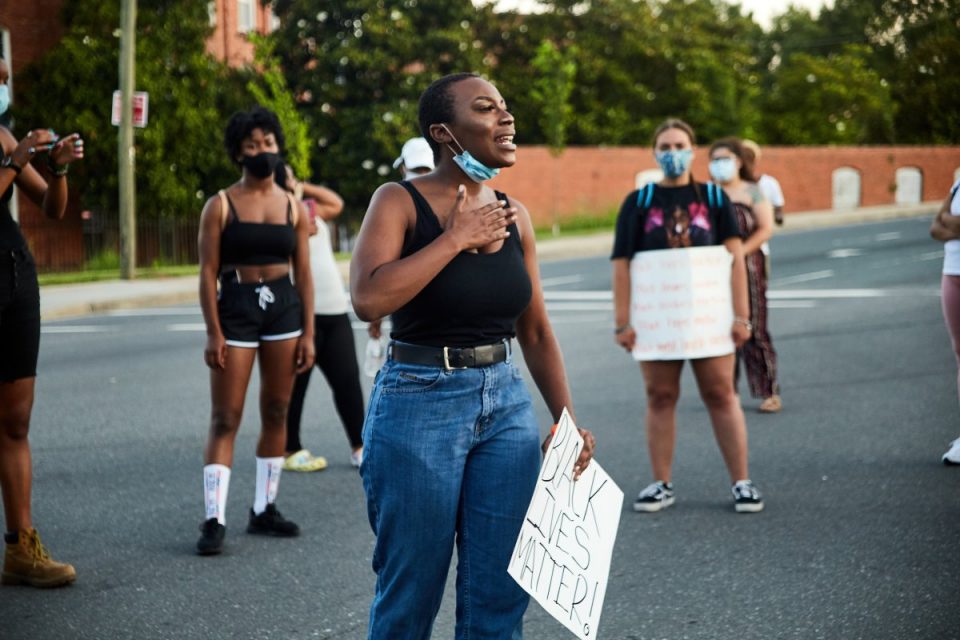Around thirty protesters with the Other American Movement marched down East Main Street as the sun set behind Durham’s skyline Thursday night. The usual swishes of traffic and buzzes of summer were broken up by chants:
“I can’t,” a Black man led the chant. “Breathe!” responded the protesters.
“I will,” he shouted. “Breathe!” they cried out.
“Our kids can’t…Breathe!”
“Our kids will… Breathe!”
Supporters with bikes blocked off side streets as the protesters marched around the police station and down to the statue of Major the Bull. Organizers had scrambled to plan the occupation and march to CCB Plaza after officers on Thursday accused four Black Lives Matter protesters of placing “protester pallets” that blocked traffic in front of police headquarters downtown.
Among the four arrested was Sheddrick “Skip” Gibbs, who has emerged as a central figure in local protests following the police killing of George Floyd. Police charged Gibbs, 33, of Durham with misdemeanors for impeding the flow of traffic and resisting, delaying and obstructing a law enforcement officer, Lt. David M. Anthony said in a press statement Thursday.
Deonte Moses, 27, Matthew Helton, 36, and Matthew Butler, 38, were also charged.
“The Durham Police Department is respectful of those who wish to exercise their First Amendment rights and peacefully protest,” Police Chief Cerelyn “C.J.” Davis said in the statement. “However, those privileges must be exercised while ensuring the highest level of public safety is afforded to our entire community. Blocking and impeding the flow of traffic with permanent structure in the public right of way is unacceptable and interferes with commuting public at large.”
The News & Observer reports that Gibbs caught the charges as he clung to one of the wooden pallets and that the officers pushed Gibbs to the ground during a brief struggle.
“I apologize to each and every one of you right now for assuming that they would do anything but what they did,” Gibbs told the protesters that night. “I want to apologize. All they know is violence. All they know is beating the shit out of people. All they know is handcuffs. All they know is mace. All they know is tasers. It’s all they know.”
Thursday marked the tenth day since Gibbs and his supporters arrived at police headquarters and set up sleeping tents and tables with water and snacks. Someone brought a charcoal grill. The makeshift occupiers of a dozen to two dozen protesters offer a drylongso contrast to the gleaming, new police building that cost more than $70 million to build.
At the night march, Gibbs announced that OAM was calling for the Durham City Council to put $900,000 of their $95 million housing bond toward Black and brown residents in need of rental and mortgage payment assistance, or to improve public housing living conditions. The group also called for a meeting with Mayor Steve Schewel and the city council, and for the local government stop discussing police violence behind closed doors.
Gibbs’s other budget requests—called the Durham Renewal Project—include grants for the creation of a Black small business development fund, a Black-owned community grocery store to fight food insecurity in impoverished communities, and the creation of an LGBTQ community center.
OAM and Gibbs’s objectives and tactics have sparked discussion among other activists. On June 1, OAM led a massive downtown protest where hundreds marched from the historically black Hayti district to the Exit 11 blue bridge, leading to a meeting between Gibbs, Schewel, and other city officials and activists. The group hoped to continue discussions about law enforcement tactics and policies with city leaders.
According to 9th Street Journal, only 15 people were allowed in the “invitation only” meeting. Other group leaders were not included in the conversation, and a livestream of the meeting was cut short. At the OAM march Thursday night, organizers from other groups were not present. The specifics of Gibbs’ meeting with the law enforcement leaders have not been made public.
“When you have community members asking can they come in, community members should never be turned away from anything,” Andréa “Muffin” Hudson told 9th Street Journal. “Anytime you shut the community out and you say you’re speaking for the community, the community will turn on you really fast.”
Thursday’s march hit its peak when participants reached the statue of Major the Bull, chanting “Whose Bull?” “Our Bull” as families stopped their evening strolls and residents peered over the balcony of the condos above WeWork. Black children climbed on the statue and the walls surrounding it, as a white family paused to hear what Gibbs had to say.
“Why are we still out here putting on posters that our lives matter? They just should. They just should,” Gibbs said, motioning toward the children. “That little boy’s life matters the same way that little boy’s life matters.”
Follow Durham Reporter Thomasi McDonald on Twitter or send an email to [email protected]. Follow Digital Content Manager Sara Pequeño on Twitter or send an email to [email protected].
Support independent local journalism. Join the INDY Press Club to help us keep fearless watchdog reporting and essential arts and culture coverage viable in the Triangle.


